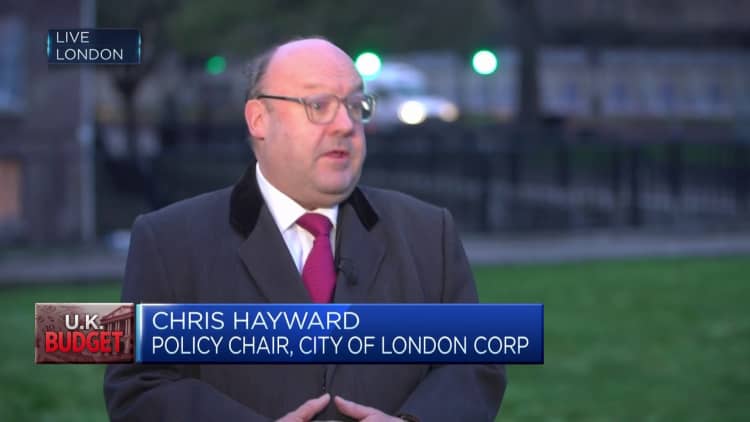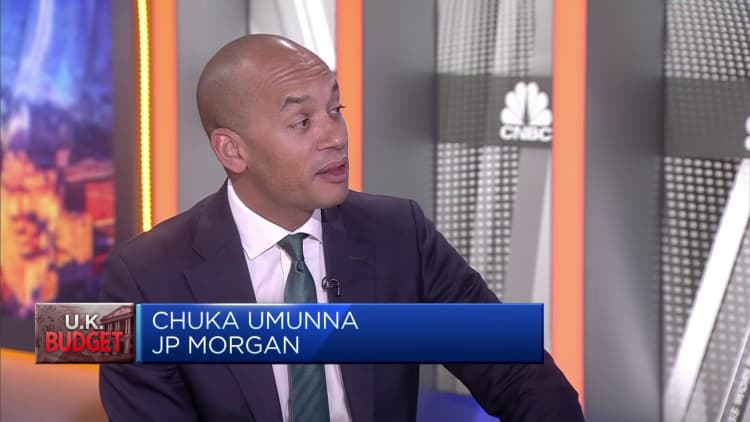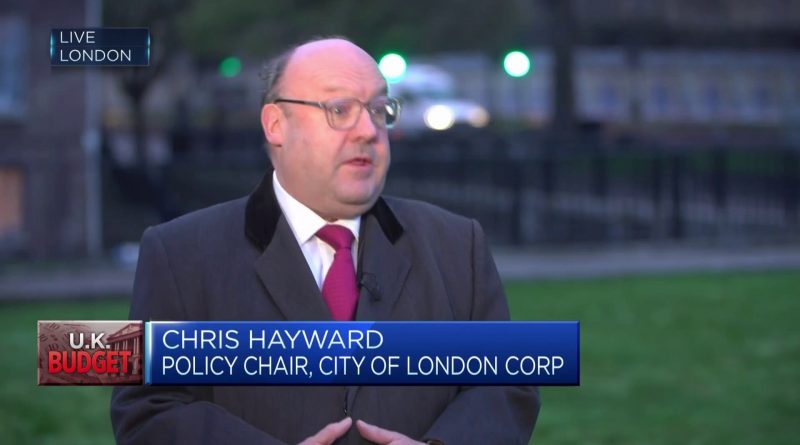UK government to deliver crucial pre-election budget announcements with economy in recession
41 Min Ago
City of London Corporation: Need to stimulate high-growth British startups

Chris Hayward, policy chairman of the City of London Corporation, tells CNBC that he would like to see measures aimed at backing burgeoning British businesses to scale up in the U.K., in order to drag the country out of a period of economic stagnation.
The organization represents the interests of the historic center of London that hosts much of the U.K.’s financial sector.
– Elliot Smith
46 Min Ago
Poll: Sunak’s Conservative Party faces historic election wipeout
Prime Minister Rishi Sunak leaves Dorland House in London after giving evidence to the UK Covid-19 Inquiry during its second investigation exploring core UK decision-making and political governance.
Jordan Pettitt | Pa Images | Getty Images
The latest national poll by Ipsos, published Monday and taken from Feb. 21 to 28, gives Prime Minister Rishi Sunak’s ruling Conservative Party a vote share of 20%, its lowest ever recorded since the market research company’s Political Monitor series began in 1978.
The poll suggests the main opposition Labour Party is on course for a landslide victory with 47% of the national vote, while the centrist Liberal Democrats are expected to pick up 9%. The Green Party and the hard-right Reform U.K. are each on course for 8%.
If these numbers played out nationally, Labour would end up with an enormous majority of more than 400 seats, according the Electoral Calculus.
Sunak’s job performance rating also reached the lowest point of his premiership, with only 19% of respondents satisfied with his performance as prime minister and and 73% dissatisfied, for a net rating of -54.
Labour leader Keir Starmer’s ratings also fell since January, with a net score of -26, only slightly above his lowest reading of -29 in May 2021.
However, voters see Labour as having the best policies across most key issues, including the economy, taxation, work, public services and public spending.
– Elliot Smith
1 Hour Ago
Hunt expected to announce 2 pence cut to National Insurance, reports say
Multiple British media outlets reported Tuesday that Hunt is expected to announce a 2 pence cut to National Insurance.
The U.K. National Insurance is a tax on workers’ income and employers’ profits to pay for state social security benefits, including the state pension.
The Treasury confirmed that the government will use its fiscal headroom to “help families with permanent cuts in taxation.”
The reported plans match the previous cut announced in Hunt’s Autumn Statement, which cut the NI rate from 12% to 10%.
Though touted at the time by the Conservative Party as the “largest ever tax cut for workers,” opposition parties and many economists were quick to point out that its benefit to payers would be wiped out by the effect of existing freezes on personal tax thresholds — known as the “fiscal drag.”
– Elliot Smith
2 Hours Ago
Berenberg: Tax cuts unlikely to help economic recovery, or Conservatives’ electoral hopes
LONDON – March 15, 2023: Tens of thousand of striking teachers are joined by workers from other striking trade unions as they march from Hyde Park towards Trafalgar square on the day of Finance Minister Jeremy Hunt’s Spring Budget announcement.
Guy Smallman/Getty images
Wednesday will be the government’s last chance to influence the economy before a general election at some point later this year.
But with limited fiscal headroom, Berenberg Senior Economist Kallum Pickering doubts modest tax cuts can materially help the Conservatives close the massive poll gap to the main opposition Labour Party, which appears on course for an historic landslide.
“First, the government simply does not have the fiscal headroom to give the economy a big shot in the arm,” Pickering said in a note Tuesday.
“Second, as power is likely to shift to Labour later this year, at best, tomorrow’s announcements may be valid for between six to nine months before the five-year plans are torn up and rewritten by the next (likely Labour) chancellor.”
The independent Office for Budget Responsibility in November estimated that the government had around £13 billion of headroom against its primary fiscal target, which is for public sector net debt to fall in the final year of its five-year forecast horizon.
Between April and January, government borrowing has thus far come in £9.2 billion below the OBR’s November forecast, but the extent of Hunt’s fiscal headroom will depend on a new set of OBR projections published Wednesday.
“While likely modest downgrades to economic growth will hurt projected public finances, stronger population growth and a lower profile for interest rates will provide a boost,” Pickering said.
“As a best guess, Hunt probably has wiggle room of around £20bn-25bn, which is below the £29.7bn of GDP-adjusted room that past chancellors have aimed for since the OBR was established in 2010. To retain credibility, Hunt will need to leave at least some headroom.”
– Elliot Smith
2 Hours Ago
Hunt: ‘We can now help families with permanent cuts in taxation’
The Treasury said late Tuesday night that Hunt will set out a “budget for long-term growth” through measures designed to build a “high wage, high skill economy.”
“Of course, interest rates remain high as we bring down inflation. But because of the progress we’ve made because we are delivering on the Prime Minister’s economic priorities we can now help families with permanent cuts in taxation,” Hunt is expected to say in Wednesday’s Budget statement.
The chancellor is also expected to reiterate the government’s message on fiscal responsibility, with some economists expecting targeted cuts to public spending.
“When it comes to borrowing, some believe there is a choice between responsibility and compassion. They are wrong,” Hunt is set to say.
“With the pandemic behind us, we must once again be responsible and increase our resilience to future shocks. That means bringing down borrowing so we can start to reduce our debt.”
– Elliot Smith
2 Hours Ago
Here’s what the government has already announced
As ever, the weekend before a big fiscal statement was peppered with teasers of what to expect on Wednesday.
The Treasury pre-announced plans over the weekend to deliver up to £1.8 billion ($2.3 billion) worth of benefits by boosting public sector productivity, including releasing police time for more frontline work.
The Independent Office for Budget Responsibility estimates that returning to levels of pre-pandemic productivity could save the Treasury up to £20 billion per year.
Hunt will also announce £360 million in funding to boost research and development (R&D) and manufacturing projects across the life sciences, automotive and aerospace sectors, the Treasury said Monday.
This will include £92 million in joint government and industry investment to “expand facilities to manufacture life-saving medicines and diagnostics products,” £200 million joint investment in zero-carbon aircraft technology and almost £73 million in automotive technology.
Pension funds will now be required to publicly disclose how much they invest in U.K. businesses versus those overseas, and poor performing projects will not be allowed to take on new business from employers.
– Elliot Smith
15 Hours Ago
‘Unity of understanding’ between Reeves and Hunt on fiscal rules, former Labour MP Umunna says

Chuka Umunna, head of EMEA ESG at JPMorgan and former U.K. Labour Party MP, discusses the upcoming General Election and the potential implications for fiscal policy.
Source – Middle east monitor




